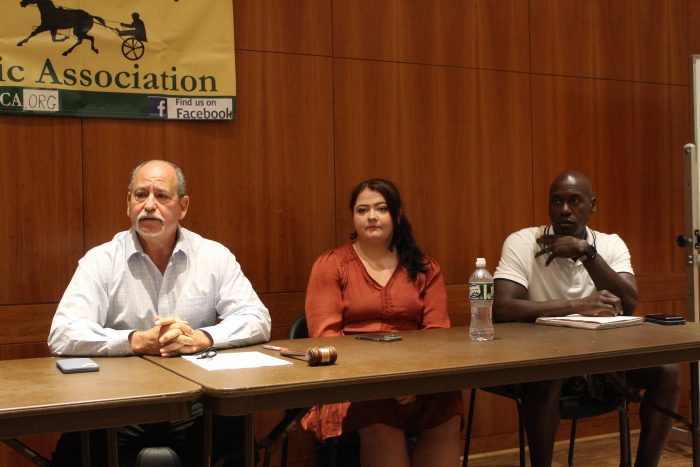PJS/T civic addresses homelessness during July meeting

By Aidan Johnson
The Port Jefferson Station/Terryville Civic Association addressed issues regarding the unhoused at its general meeting Tuesday, July 25.
The civic meeting was joined by Father Francis Pizzarelli, founder and executive director of Hope House Ministries in Port Jefferson, as well as officers from the Suffolk County Police Department and members of an organization that helps the homeless
During the meeting, Pizzarelli shared his experience assisting the homeless, including his meeting of a homeless Vietnam war veteran 35 years ago who was sleeping in a box village in the middle of winter.
The distraught veteran, who was most likely struggling with post-traumatic stress disorder, came to Pizzarelli after one of his friends who was also living in the box village froze to death.
After finding there was little help offered for homeless veterans, Pizzarelli started Pax Christi Hospitality Center, an emergency shelter for men in Port Jefferson.
Pizzarelli expressed that a stronger partnership is needed between social services, the community and law enforcement. However, Pizzarelli also noted that law enforcement’s hands are tied in many situations, though they have always “been willing to be a part of the conversation.”
Pizzarelli highlighted the lack of treatment facilities and steps in place to help people in the homeless community.
“The social networking that was in place 35 years ago is nonexistent,” Pizzarelli said. “It’s just a repetitive cycle of setting people up for failure.”
For example, there is a lack of transitional housing for people once they leave a shelter such as Pax Christi, and the ones that are there, “you wouldn’t want a rat to live in,” he said.
A Suffolk County police officer spoke about what is and is not considered a crime when it comes to homelessness, and the role that the police can play.
“We’re not allowed to arrest people for being homeless, we’re not allowed to arrest people for begging,” the officer clarified.
“It used to be against the New York State Penal Law to stand in front of a business and beg. That was taken off the books, so what we’re left with is a [state] Vehicle and Traffic Law, because realistically, it’s not going to solve the problem, us arresting them at that specific moment,” the officer continued.
The officer said police can write a person a traffic ticket if they are on a road begging, which could possibly lead to a warrant and then an arrest, but reiterated the police cannot simply make an arrest for begging.
There are also laws in place that allow police to take a person into custody if they are deemed to be either a danger to themselves or others. However, the officer explained that the law’s threshold criteria is very high.
The police department has also put the Behavioral Health Unit to effect.
“We have these officers; they go out to these specific locations where the homeless people … are, and we try to attack it [by] offering them social services such as housing and drug counseling, and we hope that they will voluntarily take it,” the officer said.
Jessica Labia and Dwayne Brown of the Long Island Coalition for the Homeless were also in attendance to speak on issues. Labia furthered the point of the lack of resources, saying, “The more resources that are put into folks that are experiencing homelessness or low income on Long Island, the more we’re able to help them get into housing.”
She also suggested that arresting homeless people wasn’t helpful, as it can make it more difficult to house people when they have a criminal history.
Labia and Brown reminded everyone that homelessness was not just in the Port Jefferson Station area, but rather Long Island as a whole has between 3,000 and 4,000 homeless people on any given night.






